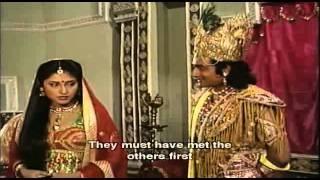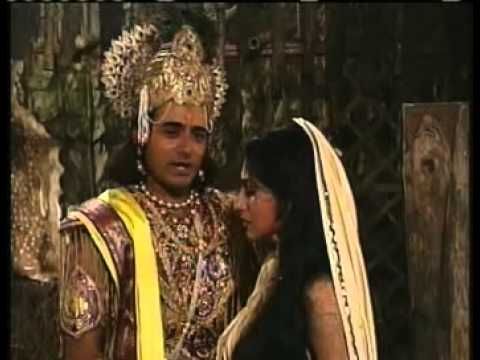

- YASH CHOPRA MAHABHARAT ALL EPISODES MANUAL
- YASH CHOPRA MAHABHARAT ALL EPISODES FULL
- YASH CHOPRA MAHABHARAT ALL EPISODES SERIES
The lyrics are timeless and valid even today when Lata Mangeshkar sings “ Aurat ne janam diya mardon ko, mardon ne usey baazar diya, Jab jee chaha maslaa kuchlaa, jab jee chaha dutkaar diya”. Sadhana’1958 took a penetrative look at how society treats a fallen woman – and women in general – when Sahir questions everyone about the differences in perception in what men do and how women endure. One would think that this is a regular interruption but the lyrics sear one’s soul when the singer – Rajendra Kumar in a special appearance – asks “ Ye kiska lahoo hai kaun mara” Later when the Partition riots break out, a song suddenly starts. Some qawwali singers in a mosque sing “ Ye masjid hai who buthkhaana Chahey ye maano chahey woh maano”. A lesser-known song penned by Sahir Ludhianvi talks about the path one takes to realize God. Partition films were conspicuous by their absence until BR produced “ Dharm Putra”, directed by Yash. The generation of filmmakers who faced the pains of Partition either stayed away from it as a taboo topic or questioned it half-heartedly. The other songs like “ Ye desh hai veer jawanon ka”, “ Aana hai to aa raahe mein”, “ Maang ke saath tumhara”, “ Reshmi salwar kurta jaali ka” all point to OPN’s prowess in being at home in any genre which too has been integrated into the film without disturbing the pace. The cynical villagers ask him whether he is a “ laat saheb, Patel, Governor or who else”, the song “ Mai Bambai ka Babu” starts with Mohammed Rafi using his “special voice” for Johnny Walker. When the villagers ask the man why he has come to the village the man replies that the world should get inspired by this event and he will be the one who will write articles in a string of newspapers. The entry of a “city reporter”, inspired by the events in the village, provides some scope for some light comic relief. The word “Saathi” can be translated as “Comrade”, thus confirming the overall socialist ethos behind Sahir Ludhianvi’s lyrics (and similar sentiments in many films of the 1950s).
YASH CHOPRA MAHABHARAT ALL EPISODES MANUAL
The best of these is “ Saathi Haath Badhana” when the villagers decide to join hands and build the road and the bridge that will help the protagonist Shankar win the horse carriage vs bus race! The villagers are fired up and take pride in their ability to do hard manual labor. The songs are seamlessly integrated into the structure of the film.

‘Naya Daur’ had hit songs that are popular, with the new generation, thanks to its re-release in a colorized version in 2007. ‘Naya Daur’ gave the message that the old (horse carriages) and the new (motorized carriages – the bus) could co-exist in the modern age and each had its place in the current social setup. With the path-breaking Naya Daur 1957, a truly new age began in film making with films geared to the then-emerging reality of serving not only as entertainers but also as a message to the populace – that of serving India in one way or the other. Soon B R Films was established and started a long and illustrious path of well-crafted films that tackled some social issue or the other. His first film as a director Afsana’1951 was a hit.
YASH CHOPRA MAHABHARAT ALL EPISODES FULL
Shifting to Bombay (now Mumbai), BR’s initial career was full of struggles.

The underlying humanity in his films is best depicted in the film ‘Dhool ka Phool’ about an orphan being adopted by a Muslim man and teaching him Tu Hindu banega na Musalman banega, Insaan ki aulaad hai insaan banega.īorn in 1914 and educated in pre-partition Lahore, BR’s career as a film journalist came to a halt due to Partition. In spite of his overtly “commercial” sensibilities with the films being loaded with songs, dances, dialogues, courtroom scenes, most of BR’s films addressed some contemporary issue or the other, often challenging then-held orthodoxy.
YASH CHOPRA MAHABHARAT ALL EPISODES SERIES
However, be the quality of the film, the music was always important for this producer-director whose banner B R Films became legendary after acquiring a new generation of fans in the 1990s with his TV Series ‘Mahabharat’. While it may look as if only 24 were directed by him, his role as a producer can’t be overlooked which gave him complete control over the overall look and feel of the film. B R Chopra (hereafter referred to as B R in this article) produced Dhool ka Phool and 50 other films and TV series under his banner B R Films, of which he directed 24. “Tu Hindu Banega Na Musalman banega, insaan ki aulaad hai insaan banega…” The song is from the film Dhool ka Phool’ 1959 which was not directed by B R Chopra but by his equally illustrious brother Yash Chopra.


 0 kommentar(er)
0 kommentar(er)
